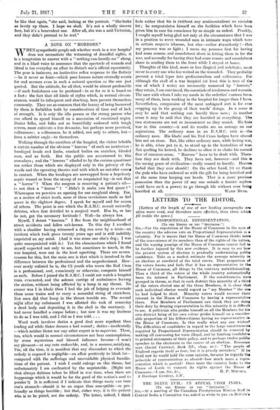LETTERS TO THE EDITOR.
(Letters of the length of one of our leading paragraphs an often more read, and therdore more cftectire, than those which fill treble the space.] PROPORTIONAL REPRESENTATION.
[To vas Eorroa or mu "Serwrrroa."1
Sus,—For the reputation of the House of Commons in the eyes of the country the adverse vote on Proportional Representation is a calamity. For it means that the House of CRIOTOODS thinks more of the convenience of its members than of the rights of the nation, and the waning prestige of the 1101150 of Commons cannot fail te be further injured by this new evidence. It is easy to see how the present system of election is gradually undermining public confidence. Take as a modest estimate the average minority is au election at one-third of time total voters. That proportion of the voters knows and feels that it has no representative in lb. House of Commons, all things to the contrary notwithstanding. Thus a third of the voters of the whole country automatically loses its interest in Parliament. If the constituencies were -grouped in threes, as that in each district this minority of a third of the voters elected one of the three Members, it is clear that each individual-elector would regard as " my Member " the one hs had helped to elect. Minority voters would recover their interest in the' House of Commons by having 'a representative there. Hon' Members of Parliament can think they are doing their duty by denying representation to this minority it is difficult to see. A politician who prides himself on all the Members for hie own district being of his own colour prides himself on a consider- able proportion of his fellow-citisens having no representative is the House of Commons. Is this really what any one wishes? The difficulties of candidates in regard to tho large constituencies required by Proportional Representation should be removed by making all canvassing for votes illegal, and by limiting candidate. to printed statements of their policy, and to perhaps twelve 'subtle speeches to the electorate in the course of an election. Rousseau says (Social Contract, Beek III., chap. ay.): "The people of England regards itself as free; but it is grossly mistaken." If he lived now he would hold the same opinion, because lie regards the principle of representation as absurd—bow much more a repre- sentation which is partial? Once more the country looks to the House of Lords to support its rights against the House of


























 Previous page
Previous page